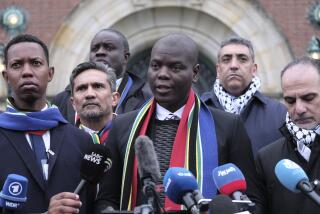Trials Point to U.N.’s Value
Two recent sentencings by the United Nations war crimes tribunals for Rwanda and the former Yugoslavia demonstrate that, for all its shortcomings, the U.N. is upholding international laws against the worst mass crimes. It has put other past and potential mass murderers and their helpers on notice that their maneuvering room is narrowing.
The Rwanda tribunal, functioning effectively after years of mismanagement, last week sentenced Pastor Elizaphan Ntakirutimana, the elderly former head of the Seventh-day Adventist Church in western Rwanda, and his son, Gerard, a doctor, to 10 and 25 years in prison, respectively. It was the first time an international tribunal had found a clergyman guilty of genocide, though many Hutu Roman Catholic priests and nuns allegedly collaborated with the militias that murdered about 800,000 people.
The Ntakirutimanas, the court said, led attackers to villages and towns to massacre thousands of Tutsi men, women and children, even transporting the killers themselves. The elder Ntakirutimana fled to Texas but was extradited in 2000. His son, accused of shooting many victims himself, was captured in Ivory Coast in 1996.
The second sentence, handed down Thursday by the U.N. tribunal for the former Yugoslavia, was no less significant. Biljana Plavsic, the former Bosnian Serb president, pleaded guilty last December to one count of crimes against humanity. Plavsic, a key associate of Radovan Karadzic, who remains at large, helped the Serbian strongman plan the slaughter of Bosnian Muslims and Croats. Unlike the Ntakirutimanas, she expressed remorse. On Thursday she received an 11-year sentence. Prosecutors may call her to testify against former Yugoslav President Slobodan Milosevic, on trial at The Hague for crimes against humanity. She is the most important figure to be sentenced by the national tribunal.
War crimes tribunals are no substitute for rapid U.N. intervention. In Bosnia and Rwanda, the U.N. disgraced itself by remaining passive and impotent in the face of massacres. Still, if the recent sentences seem like a small victory compared with the scale of carnage in Rwanda and Bosnia, they demonstrate that the U.N. can be more than the worthless debating society portrayed by its critics.
The U.N. is holding perpetrators of genocide accountable. It has successfully turned aside the claims of suspects that they were innocents or merely small cogs. The Bush administration should keep in mind that possible war crimes trials for Saddam Hussein and his followers will need the credibility of the United Nations.
More to Read
Sign up for Essential California
The most important California stories and recommendations in your inbox every morning.
You may occasionally receive promotional content from the Los Angeles Times.










